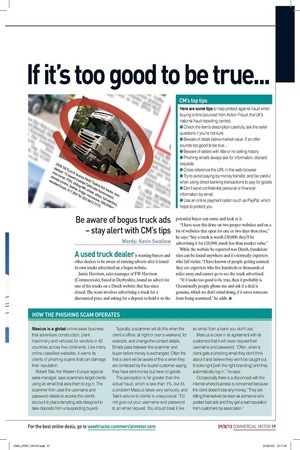If it's too good to be true... Be aware of
Page 15

If you've noticed an error in this article please click here to report it so we can fix it.
bogus truck ads stay alert with CM's tips Words: Kevin Swallow
A used truck dealer is warning buyers and other dealers to be aware of enticing adverts after it found its own trucks advertised on a bogus website. Jamie Harrison, sales manager of FW Harrison (Commercials), based in Derbyshire, found an advert for one of his trucks on a Dutch website that has since closed. The scam involves advertising a truck for a discounted price and asking for a deposit to hold it so the
potential buyer can come and look at it.
"I have seen this done on two proper websites and on a lot of websites that open for one or two days then close," he says. "Say a truck is worth £30,000, they'll be advertising it for £18,000, much less than market value."
While the website he reported was Dutch, fraudulent sites can be found anywhere and it's normally exporters who fall victim. "I have known of people getting conned; they are exporters who live hundreds or thousands of miles away and cannot go to see the truck advertised. "If it looks too good to be true, then it probably is. Occasionally people phone me and ask if a deal is genuine, which we don't mind doing, if it saves someone from being scammed," he adds. • CM's top tips Here are some tips to help protect against fraud when buying online (sourced from Action Fraud, the UK's national fraud reporting centre): • Check the item's description carefully, ask the seller questions if you're not sure
• Beware of deals below market value. If an offer sounds too good to be true... • Beware of sellers with little or no selling history • Phishing emails always ask for information, discard requests • Cross-reference the URL in the web browser • Try to avoid paying by money transfer, and be careful when using direct banking transactions to pay for goods
• Don't send confidential personal or financial information by email. • Use an online payment option such as PayPal, which helps to protect you HOW THE PHISHING SCAM OPERATES
Mascus is a global online sales business that advertises construction, plant machinery and vehicles for vendors in 42 countries across five continents. Like many online classified websites, it warns its clients of phishing scams that can damage their reputation.
Robert Tate, the Western Europe regional sales manager, says scammers target clients using an email that asks them to log in. The scammer then uses the username and password details to access the client's account to place tempting ads designed to take deposits from unsuspecting buyers.
Typically, a scammer will do this when the client is off line, at night or over a weekend, for example, and change the contact details. Emails pass between the scammer and buyer before money is exchanged. Often the first a client will be aware of this is when they are contacted by the duped customer saying they have sent money but have no goods. The perception is far greater than the actual fraud, which is less than 1%, but it's a problem Mascus takes very seriously, and Tate's advice to clients is unequivocal: "Do not give out your username and password to an email request. You should treat it like
an email from a bank you don't use."
Mascus is clear in its agreement with its customers that it will never request their username and password. "Often, when a client gets a phishing email they don't think about it and believe they won't be caught out. It looks right [with the right branding] and they automatically log in," he says.
Occasionally there is a disconnect with the internet where business is concerned because the client doesn't lose any money. "They are letting themselves be seen as someone who posted bad ads and they get a bad reputation from customers by association."













































